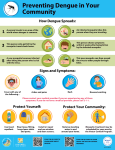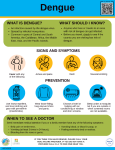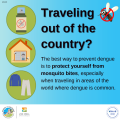Dengue
Page originally published 7/25/2024. Page last updated 6/13/2025.

Dengue (den-gee) is a virus spread by infected Aedes mosquitoes (Aedes aegypti and Aedes albopictus), which live in many parts of the world, including the United States, and in California and San Diego County.
According to the World Health Organization (WHO), almost half of the world’s population, 4 billion people, live in dengue-risk areas. areas where dengue infection occurs. In San Diego County, dengue cases are reported every year in travelers returning from other parts of the world where dengue is common.
On this page:

The best way to prevent dengue is to protect yourself from mosquito bites, especially when traveling in areas of the world where dengue is common.
- Use Environmental Protection Agency (EPA)-registered repellent on clothes and exposed skin.
- Wear loose-fitting, long sleeve shirts and pants to make it harder for mosquitoes to find a place to bite you.
- Control mosquitoes around your home
- Aedes mosquitoes that can spread dengue are found in
California.
- Dump and dran any standing water in and around your home where mosquitoes can breed and lay eggs.
- If you notice mosquitoes biting during the day or see high mosquito activity in your area, contact your local vector control agency to report it or schedule an inspection. Trained technicians can check and treat places when needed.
Plan for Travel:
-
Before your trip
- Check for travel recommendations, health notices, and warnings specific to your destination country.
- Visit a travel clinic, or your doctor, to ask about medical care before you travel, including any recommended vaccines or medications.
- Pack insect repellent.
- Pack acetaminophen in your first aid kit. This medication can be used to manage fever and body pain if you get dengue.
-
During your stay
- Follow steps to prevent mosquito bites to protect yourself and your family.
- Stay in places with air conditioning or window and door screens, when possible.
- Use a bed net if air conditioned or screened rooms are not available or if sleeping outdoors.
- See a healthcare provider if you develop a fever or have symptoms of dengue.
-
After your trip
- Even if you do not feel sick, if you have traveled to a place with dengue risk, protect yourself from mosquito bites for 3 weeks. If you're infected and don't know it, you can still spread dengue to mosquitoes.
- See a doctor if you develop a fever or have symptoms of dengue. Tell your doctor about your travel.
Dengue is common in many tropical and other areas of the world where Aedes mosquitoes thrive. These areas include:
- Latin America and the Caribbean
- U.S. territories, including Puerto Rico and American Samoa
- South Asian/Indian subcontinent
- Southeast Asia and the Pacific Islands
Local outbreaks of dengue have been reported in some U.S. states, but these outbreaks have been limited in spread. In California, almost all reported cases of dengue are in people who were infected by mosquitoes while traveling to other parts of the world. Currently, local transmission of dengue in California is very rare.
People get dengue from the bite of an infected Aedes mosquito.
- Dengue virus is not spread from person to person.
- People can get infected with dengue more than once in their life.
In a small number of cases, dengue can spread:
- Through exposure in a laboratory or healthcare setting;
- From mother to baby during pregnancy, delivery, or breast feeding;
- Blood transfusions, organ transplants, and needlestick injuries. Blood banks and organ transplant centers routinely test for dengue to prevent spreading the infection.
After getting bitten by a mosquito with dengue virus, symptoms may develop within 2 weeks.
About 1 in 4 people infected with dengue virus will get sick.
- For people who get sick, symptoms can be mild or severe.
- Illness from dengue virus typically lasts 2-7 days.
- Most people recover after about one week.
- Headache;
- Pain behind the eyes;
- Muscle, joint, or bone pain;
- Nausea;
- Vomiting; and/or
- Rash.
About 1 in 20 people who get sick with dengue can get severe dengue. Severe dengue is a medical emergency. It can quickly lead to shock, internal bleeding, or death. Go to a clinic or emergency room immediately if you or a family member have:
- Stomach pain or tenderness;
- Vomiting (3 or more times in 24 hours);
- Bleeding from the nose or gums;
- Blood in vomit or stool (poop), and/or
- Feeling extremely tired or restless.
These warning signs usually begin 24-48 hours after the fever has gone away. People who have had dengue before are at greater risk of severe dengue illness
For infants, watch for signs of dehydration, such as peeing less often; a dry mouth, tongue, or lips; few or no tears when crying; and sunken soft spots of the head or eyes. If these symptoms appear, contact your child’s doctor right away. If your baby shows severe dehydration, which includes sleepiness or low on energy; sunken eyes; cold or discolored hands or feet; and only peeing once or twice a day, go to an urgent care or emergency room immediately.
If you think you may have dengue, talk with your doctor. Your doctor may:
- Ask about your signs and symptoms,
- Ask you if you traveled and were bitten by mosquitoes, and
- Take a blood sample to be tested.
There are no antiviral medicines available to treat dengue. Antibiotics do not work against viruses. Getting plenty of rest, drinking fluids, and taking over-the-counter pain medications may relieve some symptoms. In severe cases, people may need to be hospitalized for extra care.
- Note: For pain and fever medications, take acetaminophen. Do not take aspirin or ibuprofen.
Local
State
- Dengue Virus (California Department of Public Health)
- EPA-Registered Repellent Ingredients (California Department of Public Health)
- Invasive Mosquitoes are in Your Community (Mosquito and Vector Control Association of California)
Federal
Educational Materials
Call the Epidemiology Unit at (619) 692-8499, or send an email, for more information.









